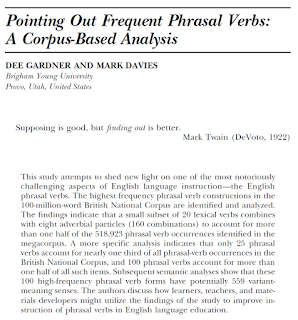Phrasal verbs are essential for anyone who wants to master the English language, particularly in spoken English, they appear ever so often in daily conversations. For one reason or another, they are usually not the main focus of teaching in schools.
I have a few predictions I want to make.
- There are too many phrasal verbs, which ones should I learn first?
- Which ones are more useful, common and popular?
- There are so many different meanings with the same phrasal verb. How to learn all?
- Phrasal verbs are formal enough, why should we teach it?
No matter what the reasons are, it will be great to know which are the most frequently used phrasal verbs. Like I mentioned in the last entry Usage: "No" & "Not"? Is That Even A Problem?, it will be biased to make a claim such as "the most popular phrasal verbs" without stating the boundaries, and so, in this paper "Pointing Out Frequent Phrasal Verbs: A Corpus-Based Analysis" by Gardner & Davies (2008), they have only chosen the data from the British National Corpus which includes both spoken and written English data.
In their research, they have filtered out the some of the top 20 Lexical Verbs (LV) in phrasal verbs and achieved the following finding,
Then the authors continued to locate the number of occurrence for the actual phrasal verbs and obtained the following data,
For me, I have narrowed it down to Top 10 among the top 20 lexical verbs functioning in phrasal verbs listed, top 10 combinations of phrasal verbs are:
Total count in the research = 278,780
Which means that Top 10 account for 31.6% of the total number of phrasal verbs appeared on the British National Corpus (BNC).
|
This is an amazing finding because among 100% of the phrasal verbs used in this research from the entire BNC, 31.6% of it comes from these top 10 phrasal verbs!!!! So the next step is simply to learn the Word Senses ( = different meanings in the same phrasal verb).
The following table lists out the number of word senses found in the BNC, for examples, "Go on" has 5 different meanings, "Carry out" has 2 different meanings, "Set up" has 15 different meanings, and so on.
For the meanings of each phrasal verb, I will leave this for you to find out as a training, but if you ask me which are the phrasal verbs to learn first, I can now say, according to Gardner & Davies (2008) from their
corpus research using data from the BNC, the Top 10, 20 or 100 are as listed above.
"An argument must have strong support to be convincing." -- Locky
Resources:
Usage: "No" & "Not"? Is That Even A Problem? @ Locky's English Playground
"Pointing Out Frequent Phrasal Verbs: A Corpus-Based Analysis" by Gardner & Davies (2008)
Vocabulary: A Helpless Man Sponge Naitard @ Locky's English Playground







No comments:
Post a Comment